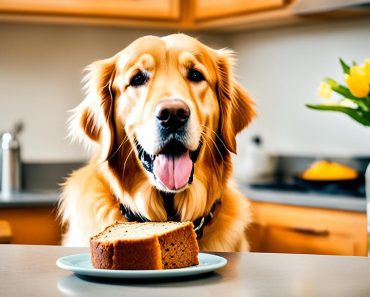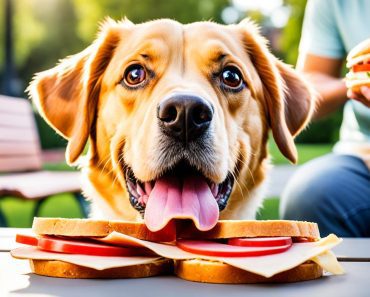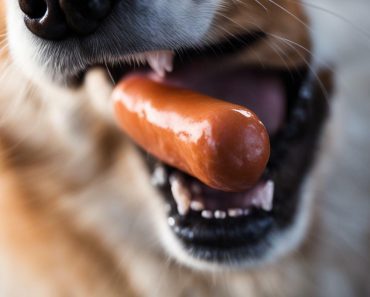As pet owners, we always want to ensure the health and well-being of our furry friends. But when it comes to sharing our favorite snacks with them, it’s important to be cautious and mindful of what is safe for their consumption. One common question that arises is, can dogs eat Skittles?
Skittles, the colorful and popular candy, may seem harmless, but when it comes to our canine companions, it’s best to err on the side of caution. Feeding Skittles to dogs can pose potential health risks and should be avoided. Here’s why:
Firstly, Skittles contain a high amount of sugar, which is not suitable for dogs. Excessive sugar intake can lead to weight gain, dental issues, and even increase the risk of diabetes in dogs. Additionally, Skittles also contain artificial flavors, colors, and other ingredients that can be harmful to dogs.
Moreover, the small size and hard texture of Skittles can present a choking hazard for dogs, especially smaller breeds or those prone to gulping their food. Ingesting Skittles can lead to an upset stomach, diarrhea, vomiting, and in severe cases, pancreatitis, which is a life-threatening condition.
So, while a few Skittles may not immediately harm your dog, it’s best to avoid feeding them this candy altogether. Instead, prioritize their health and well-being by opting for safe alternatives and adhering to proper dog nutrition guidelines.
Can Dogs Eat Skittles? Yes occasionally, but they shouldn’t.
- Skittles should not be given to dogs due to their high sugar content, artificial ingredients, and potential choking hazard.
- Feeding Skittles to dogs can lead to digestive issues, weight gain, dental problems, diabetes, and even pancreatitis.
- Safe alternatives for dogs include dog-specific treats, fruits, and vegetables that are free from harmful ingredients.
- It is important to prioritize your dog’s health by avoiding harmful foods and providing them with nutritionally balanced treats.
- If your dog accidentally consumes Skittles or experiences any concerning symptoms, consult a veterinarian for guidance.
Checking the Ingredients in Skittles
When it comes to our furry friends, it’s important to pay attention to what they eat. Let’s take a closer look at the ingredients in Skittles to understand why they may not be suitable for dogs.
Skittles contain a variety of ingredients that may not sit well with our canine companions. One of the main concerns is the high sugar content in Skittles. Just like in humans, excess sugar consumption can lead to weight gain, dental issues, and an increased risk of diabetes in dogs.
But that’s not all. Skittles also contain artificial flavors and colors, which can potentially cause digestive upset and allergic reactions in dogs. These artificial ingredients, including food dyes and flavors, may not agree with our furry friends’ sensitive stomachs.
Another ingredient in Skittles that raises concerns is hydrogenated palm kernel oil. This type of oil is high in saturated fat and can contribute to obesity and even pancreatitis in dogs, a condition characterized by inflammation of the pancreas.
Additionally, Skittles contain wheat, which may cause allergies or digestive issues in dogs with sensitivities. And let’s not forget about gelatin, derived from animal collagen, which is found in Skittles. While gelatin is generally safe for dogs, excessive consumption may lead to digestive issues.
Considering these ingredients, it’s clear that Skittles may not be the best choice for our furry friends. Fortunately, there are plenty of safe alternatives for dogs to enjoy as treats. Dog-specific treats that are formulated for their nutritional needs are a great option. Additionally, fruits and vegetables such as apples, bananas, carrots, and blueberries can be given as snacks in moderation. Peanut butter without the artificial sweetener xylitol can also be a tasty and nutritious treat option for dogs.
By being mindful of the ingredients in the treats we feed our dogs, we can prioritize their health and well-being.
Why Skittles May Be Harmful for Dogs?
Skittles can pose a risk to dogs due to their high sugar content, artificial ingredients, and potential choking hazard. Artificial ingredients found in Skittles, such as chemical additives, artificial sweeteners, preservatives, and flavors, can lead to digestive upset, allergic reactions, and other health issues in dogs.
The excessive sugar in Skittles can contribute to weight gain, dental problems, and an increased risk of diabetes in dogs. It is crucial to prioritize your dog’s health by avoiding Skittles and choosing natural, dog-specific treats as a safer alternative.
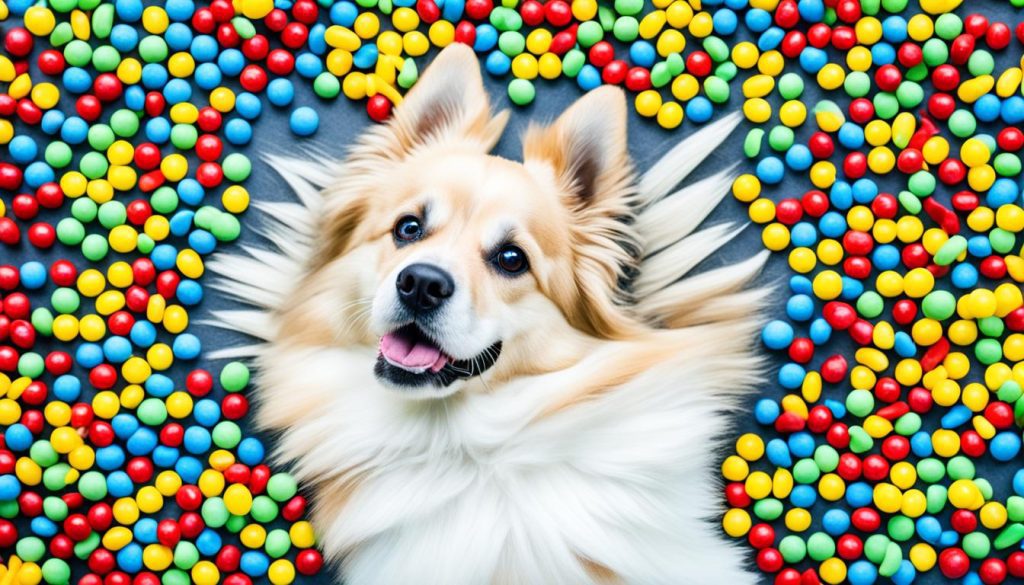
- Artificial ingredients in Skittles can cause digestive upset and allergic reactions in dogs.
- The high sugar content in Skittles can lead to weight gain, dental problems, and an increased risk of diabetes in dogs.
- Avoiding Skittles and opting for natural, dog-specific treats can promote your dog’s health and wellbeing.
What Happens If a Dog Eats Skittles?
If a dog eats Skittles, there can be negative effects on their health due to the high sugar content and artificial ingredients present in the candy. Dogs may experience an upset stomach, leading to symptoms such as diarrhea and vomiting. These digestive issues can be attributed to the excessive sugar intake from Skittles, which may disrupt their digestive system.
In more severe cases, dogs can develop pancreatitis after consuming Skittles. Pancreatitis is characterized by inflammation of the pancreas and can cause sharp abdominal distress for dogs. This condition can be life-threatening and requires immediate veterinary care.
It is crucial to closely monitor your dog if they consume Skittles and be vigilant for any concerning symptoms. If you notice your dog experiencing digestive issues or any signs of discomfort, it is important to seek veterinary attention promptly.
To prevent upset stomach and other potential digestive issues, it is highly recommended to avoid feeding Skittles to dogs altogether. Instead, opt for safer treat options that are specifically formulated for dogs’ nutritional needs. There are various dog-specific treats available in the market, ensuring that your dog can enjoy tasty and safe alternatives to Skittles.
If you are looking for natural options, you can consider offering your dog small portions of dog-friendly fruits and vegetables. Some examples include apples, bananas, carrots, and blueberries. These fruits and vegetables can provide essential nutrients while keeping your dog’s taste buds satisfied.
Remember, your dog’s health and well-being should always be prioritized, and providing them with appropriate treats is essential in supporting their overall health.
What to Do If Your Dog Eats Skittles?
If your dog ate Skittles, it’s important to take immediate action to ensure their safety. Here are the steps you should follow:
- Remove any remaining Skittles: If there are any Skittles left, make sure to remove them from your dog’s reach to prevent further ingestion.
- Assess the situation: Determine the quantity of Skittles your dog consumed. This information will be helpful when contacting your veterinarian.
- Contact your veterinarian: Reach out to your vet for guidance and inform them about the Skittles ingestion. They will advise you on the best course of action based on your dog’s size, quantity ingested, and overall health.
- Inducing vomiting: In some cases, your veterinarian may recommend inducing vomiting to remove the Skittles from your dog’s stomach. Please follow their instructions carefully if this is necessary.
- Monitor for symptoms: After the Skittles ingestion, keep a close eye on your dog for any unusual symptoms. These might include vomiting, diarrhea, lethargy, or changes in behavior. If you notice any concerning signs, contact your veterinarian immediately.
- Prevent future incidents: To avoid similar incidents in the future, it’s crucial to keep Skittles and other potentially harmful substances out of your dog’s reach. Take appropriate measures to secure your home and ensure your dog’s safety.
Remember, the ingestion of Skittles can potentially cause harm to your dog, so it’s important to seek professional veterinary advice. By acting quickly and responsibly, you can help ensure your furry friend’s well-being.
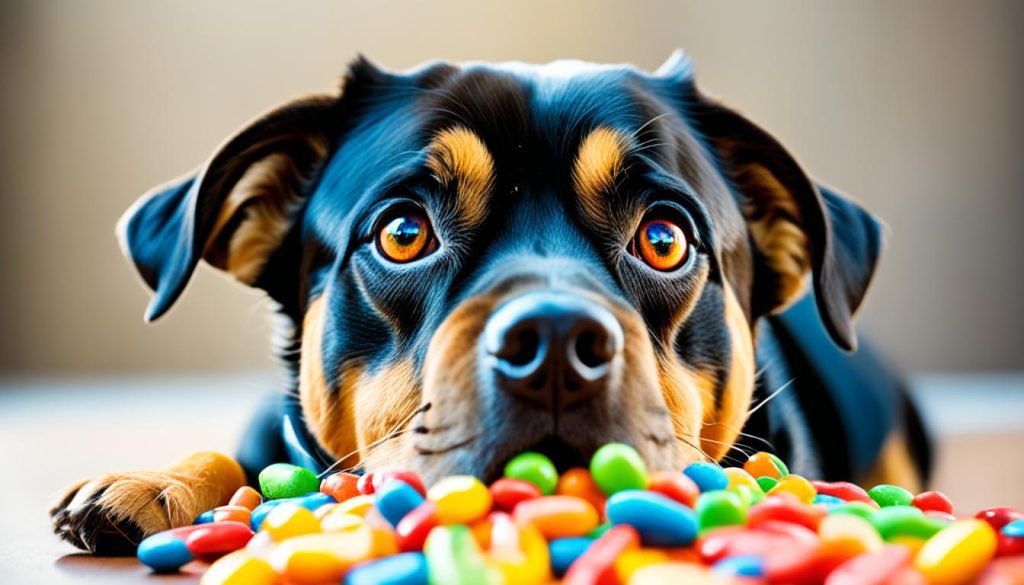
Safe Alternatives for Dogs to Enjoy as Treats
Instead of feeding Skittles to dogs, there are plenty of safe alternatives that can satisfy their cravings for treats. These options not only taste great but also provide nutritional benefits for your furry friend. Here are some healthy alternatives:
- Dog-Safe Treats: Dog-specific treats are designed to meet the nutritional needs of dogs. They come in various flavors, textures, and sizes to cater to different preferences. Choose treats that are made with high-quality ingredients and free from artificial additives.
- Fruits and Vegetables: Many fruits and vegetables are safe for dogs and can be offered as occasional treats. Apples, bananas, carrots, and blueberries are popular choices. Remember to remove any seeds, stems, or pits and offer them in bite-sized pieces to prevent choking hazards.
- Peanut Butter: Peanut butter is a tasty and nutritious treat option for dogs. However, it’s important to choose a variety that does not contain xylitol, as this artificial sweetener can be toxic to dogs. Look for natural, unsweetened peanut butter that only contains peanuts and possibly salt.
By providing your dog with these safe alternatives, you can ensure that they receive treats that promote their well-being. Remember to offer these alternatives in moderation, as too much of a good thing can still lead to health issues. Keep in mind that every dog is unique, so it’s important to consult with your veterinarian before introducing any new treats or foods into their diet.
Conclusion
While it is generally safe for dogs to have skittles occasionally, it’s important to note that these candies offer no nutritional benefits for our furry friends and can potentially lead to health issues. Feeding dogs skittles can result in an upset stomach, dental problems, weight gain, and even diabetes due to the high sugar content. To prioritize their nutrition and well-being, it is best to avoid giving dogs skittles and instead opt for healthier treat options.
Although it may be tempting to share our favorite candy with our dogs, it’s important to remember that dogs have different dietary needs and sensitivities. While skittles may be enjoyed as a rare treat for dogs, it’s crucial to always moderate the amount given and consider the potential risks. Instead, we should focus on providing our dogs with treats that promote their nutrition and overall health.
There are plenty of safe alternatives for dogs to enjoy as treats. Dog-specific treats that are formulated for their nutritional needs, as well as fruits and vegetables that are safe for dogs to consume in moderation, are great options. Examples of dog-safe fruits and vegetables include apples, bananas, carrots, and blueberries. Additionally, xylitol-free peanut butter can be a tasty and nutritious treat option for dogs.
While dogs can have an occasional taste of skittles, it’s best to prioritize their health and opt for treats that offer nutritional benefits. Skittles should be considered a rare indulgence rather than a regular part of a dog’s diet. By providing our dogs with healthier alternatives and maintaining a balanced diet, we can ensure their well-being and happiness.


